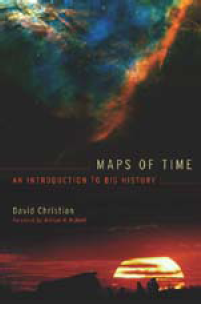Historian David Christian argues that the human learning capacity is the key distinguishing feature of the human species. It is what makes humans unlike any other species. Beyond this, the emergence of this capacity in just one species seems to be one of the great transitions the story he tells—the ‘big history’ of the universe.

We have seen similar transitions before. Human history marks the sudden and unexpected emergence of a new level of complexity, as did the first appearance of stars, of life on Earth, or of muticelled organisms …
Our history is utterly different even from that of our closest relatives, the chimps. Though they are extremely close to us genetically, physically, socially and intellectually, we have no evidence that their numbers, the range they occupy, or their technologies have changed greatly during the past 100,000 years. Indeed, that is precisely why humans can be said to have had a ‘history’, while the very idea of chimps having one seems slightly bizarre. Most animal species don’t have histories in as we usually use the word; once they have evolved, they tend to remain within their original nice until they vanish from the fossil record …
Clearly, a fundamental threshold of some kind is crossed with the appearance of our species. Human history marks the appearance of new rules of historical change …
All species adapt to their environment, but most have only one or two adaptive tricks to their repertoire. In contrast, humans seem to constantly develop new ecological tricks, new ways for extracting resources from their environment. In the jargon of economists, humans seem to have a highly developed capacity for ‘innovation’. And they innovated not on the Darwinian scale of hundreds of thousands or millions of years, but on a scale ranging from thousands of years to decades and even less …
Like many of the transitions of this kind, the emergence of our species was quite sudden. On a palaeontological scale, it was almost an instantaneous event. This means that we should expect to find a single trigger. In star formation, temperatures, temperatures rise over long periods until suddenly a trigger is released when hydrogen starts to fuse. So it is with human evolution: adaptive skills that may have evolved over many millions of years were suddenly transformed when a threshold was crossed. How can we describe this threshold?
It clearly has something to do with an enhanced capacity to learn. Many animals learn, from flatworms to toads. But most of what animals learn is lost when they die. Of course, some teaching does go on. Chimp mothers teach their children to crack nuts or fish for termites by demonstrating how to do it. And the infants, in time, may teach their children. But we know of no animal that can describe what to do in the abstract—no animal that could explain how to fish for termites without giving a demonstration, or give an account of a pathway without walking along it; and we certainly know of no animal that could describe abstract entities such as gods or quarks or pink elephants. The past and the future, too, are abstractions, for only the present can be experienced directly; thus animals without symbolic language may lack the ability humans have to deliberately think about the past and imagine the future …
Human language … allows more precise and efficient transmission of knowledge from brain to brain. That means humans can share information with great precision, creating a common pool of ecological and technical knowledge, which in turn means that for humans, the benefits of cooperation increasingly tend to outweigh the benefits of competition … Furthermore, the ecological knowledge contributed to that pool by each individual can survive long after his or her death. So knowledge and skills can accumulate nongenetically from generation to generation, and each individual has access to the stored knowledge of many previous generations. Thus what is distinctive about humans is that they learn collectively.
Christian, David. 2004. Maps of Time: An Introduction to Big History. Berkeley CA: University of California Press. pp. 139, 142–3, 144, 145–6. || Amazon || WorldCat
